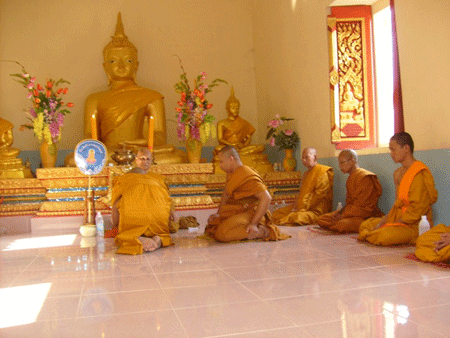
Formally becoming a Buddhist means to take refuge in the Three Jewels – the Buddha, the Dharma and the Sangha. Learn about the refuge vows and embracing Buddhism.
While practitioners can enjoy and benefit from the teachings and practices of Buddhism without really ‘joining’ a Buddhist school, it is indeed a profound step and plays a strong role in strengthening one’s beliefs and practices.
Deciding to become a Buddhist means three main things – understanding the importance of renunciation, taking refuge in the Three Jewels and finally, receiving the ethical guidelines or precepts.
Seeking shelter or taking refuge in the three Treasures or Jewels of Buddhism – the Buddha, the Dharma and the Sangha in indeed, an important and integral part of formally becoming a Buddhist.
Here is an introduction to the concept of taking refuge and the meaning of the Buddhist refuge vows.
What Does Taking Refuge Mean
The phrase ‘taking refuge’ means “seeking shelter.” In Buddhism, taking the three refuges or Ti Samana Gamana means seeking shelter from the negativity, the evils, the obstacles and the cycles of life and death.
Thubten Chodron writes in Buddhism for Beginners, “Taking refuge means relying wholeheartedly on the Three Jewels to inspire and guide us toward a constructive and beneficial direction in our lives.”
Different Buddhist schools have various adaptations of the refuge ceremony, however, for the most part taking refuge involves reciting the refuge vows, which according to Bhikku Bodhi are:
* Buddham saranam gacchami – “I go for refuge to the Buddha;”
* Dhammam saranam gacchami – “I go for refuge to the Dhamma;” and
* Sangham saranam gacchami – “I go for refuge to the Sangha.”
While it may seem at first glance that the Three Jewels are something external, outside of one’s own being, Buddhist teachers and masters suggest that actually the Three Jewels are eventually found within one’s own heart and mind.
They exist in the form of innate awareness, compassion and kindness.
The Buddhist Vow of Taking Refuge in the Buddha
The first of the Three Jewels is the Buddha. According to Khenpo Karthar Rinpoche in Dharma Paths, “The Buddha signifies the awakened mind, the mind that embodies all-pervading wisdom and omniscience.”
In other words, by taking refuge in the Buddha, one attempts to attain the same state of enlightenment as the Buddha and one strives to emulate him in all aspects of life.
As the Venerable Master Chin Kung says, “We are not to take refuge in the Buddha by relying on him, but that we were to return from our delusion and rely upon our innate true nature, our Buddha-nature.”
Therefore, taking refuge in the Buddha also means to tap into our inherent Buddha nature and dispel the darkness and negativity.
The Buddhist Vow of Taking Refuge in the Dharma
The second refuge vow signifies the importance of the teachings and precepts of Buddhism that have served to enlighten and awaken practitioners for hundreds of years.
Khenpo Rinpoche describes the Dharma as the path that makes it possible for sentient beings to achieve Buddhahood.
The Venerable Master Chin Kung calls the Dharma Jewel, “the infinite, innate wisdom of true nature that is also called Prajna wisdom.” By taking refuge in the Dharma, practitioners depend upon Buddhist teachings when talking, thinking and doing things.
The Buddhist Vow of Taking Refuge in the Sangha

The third vow is about taking refuge in the Sangha, which refers to the community of elders who have experienced and attained enlightenment and are now in a position to help others.
The Sangha, according to Rinpoche, make it possible for the teachings of the Buddha to be available to everyone and help members conquer confusion, doubt and other negative tendencies.
The Sangha, according to the Venerable Master Chin Kung, is the “purity of mind and the harmony of life.”
Taking refuge in the Sangha, therefore, is leading a life that is pure, free of temptations and in harmonious balance with society and community.
The Three Jewels and the Refuge Vows signify embracing the faith and philosophy of Buddhism and Buddhist teachings.
Taking the refuge vows in other words is simply an affirmation of one’s determination to tap into an innate Buddha nature and to lead a life that is pure, free of negativity and respectful of all living beings.
Source : buddhist-beliefs.suite101.com





Comments are closed.